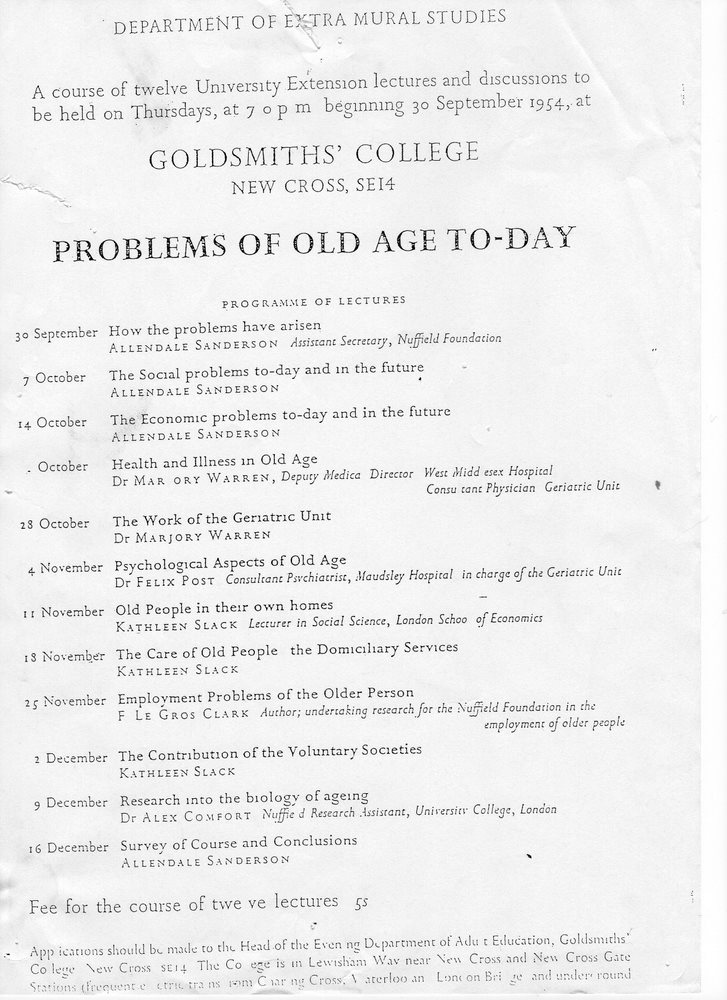Here are some more personal notes from a conference. As ever, they are in no sense a representation of everything that was said, just some of the things that struck me as interesting or connected with my own work. Things that are my thoughts rather than what other people said are in square brackets. The conference is the:
British Society of Gerontology
41st Annual Conference
University of Keele
10th-12th July 2012
The conference got off to a great start for me when my fellow-CABS member, ex-colleague, ex-PhD supervisor and, I hope I do not presume too much to say, friend, Bill Bytheway was presented with the BSG’s Outstanding Achievement Award for his contribution to British gerontology. I’ve written more about that over here on the CABS blog. But it made a very happy start to the conference for me.
More note form from now on:
Opening Plenary
Prof Toni Calasanti
Virginia Tech, USA
Different or unequal? Considering power relations
Existing critiques of ‘successful’ ageing [Katz, Minkler and Holstein, all the stuff I wrote about in K319 LG2 final section] . What happens if you put these critiques together with gender analysis?
Sexualised vulnerable older women in Life Alert ads (call buttons)
Youth based standards of sex. Seeking to show OP have sex too or something ‘just as good’ e.g. non-PIV but still sex. This retains insidious ageism.
Why not see elders’ sex as more valuable? Link w reproduction is broken anyway. More sensual? More pleasure-seeking?
Let old people be old and that be valuable.
Chris Gilleard
Sex in later life: From sex to salvation
Non-sexual nature of later life used to be morally virtuous, because sex was sinful. So a virtuous old age was non-sexual. Inversion of nowadays.
Sexual activity as cause of ageing – using up moisture and heat. Hippocratic theory of humours. Sex is hot and wet (blood and air), ageing is dry and cold (black bile and earth). Continuing influence into the medieval period and up to 17th C
Then 17th C onwards, sex less sinful and less harmful
Harvey’s circulation of blood shows that blood is not used up but continuously circulated so impacts on ideas of sex in old age.
But old ideas continued anyway.
18th C physiology developed, awareness of glands – realisation that sexual activity can be separated from reproduction and that sexual fluids do things other than aid reproduction.
19th C increased regulation of sex. But age related decline in sexual function is noted but not mandated
Lots of interest at turn of twentieth century and early twentieth C in prolonging youth through organotherapy, rejuvenation techniques [like now anti-ageing medicine]
Audience member: presentation blind to gender – it was all about men
CG: could have talked about extract of ova for women in 20th C but before that it was all focused on men.
Ann O’Hanlon
Dundalk, Ireland
Exploring and measuring age-friendliness amongst older people.
Age friendly communities. Dundalk was one of the 35 cities and towns in the 2004 WHO study
Discussion: Ann O’Hanlon’s question: why hasn’t the older people’s movement taken off in the way that feminism did?
Me: because it’s not grass-roots.
Audience member: because of internalised ageism
[I thought: but feminism was partly about excavating internalised sexism through consciousness raising – OP could do that]
Audience member: Group of 50 older feminists, met recently to apply CR techniques to own internalised ageism. But what they are focusing on is supporting one another, not changing the world. Is this something to do with ageing [No! Not if, by that, you mean something inherent to the ageing process]
[Should the question actually be ‘why did the feminist movement succeed (in some ways though obviously not all), when black rights did less well (although don’t forget end of segregation in US), class struggle died with Thatcher / the end of communism in Europe, and other social movements never got off the ground?
What happened to the grey panthers?
There are, at least, activist groups of disabled people.
It is just because the historical moment when movements around identities could make significant impact has passed, because we’ve all (some of us) got so post-modern and fractured in our identities?]
Cassandra Phoenix
Pennisula College
Research design: Attend people’s usual exercise session, take a photo, download to iPad, immediately discuss pictures during interview.
This design proved impractical – turned into too much discussion of the quality of the photos + post exercising participants didn’t want to be interviewed – tired!
So instead researchers selected 8-10 photos and emailed them – look at photos, answer question ‘what is it like to [insert sport]’ then some more prompting questions, including prompted them to talk about five senses. So got written data in the end.
People didn’t comment on the images very much – tended to do so at end. Whereas researchers intended it to be photo-elicitation. Did caption some photos – doesn’t seem very phenomenological. But actually quite telling, like small stories in identity construction. Captions often about the body rather than life through the body
Some people made references to the pictures in their writing.
Q ‘what it is like to’ was understood as ‘why do you like?’






